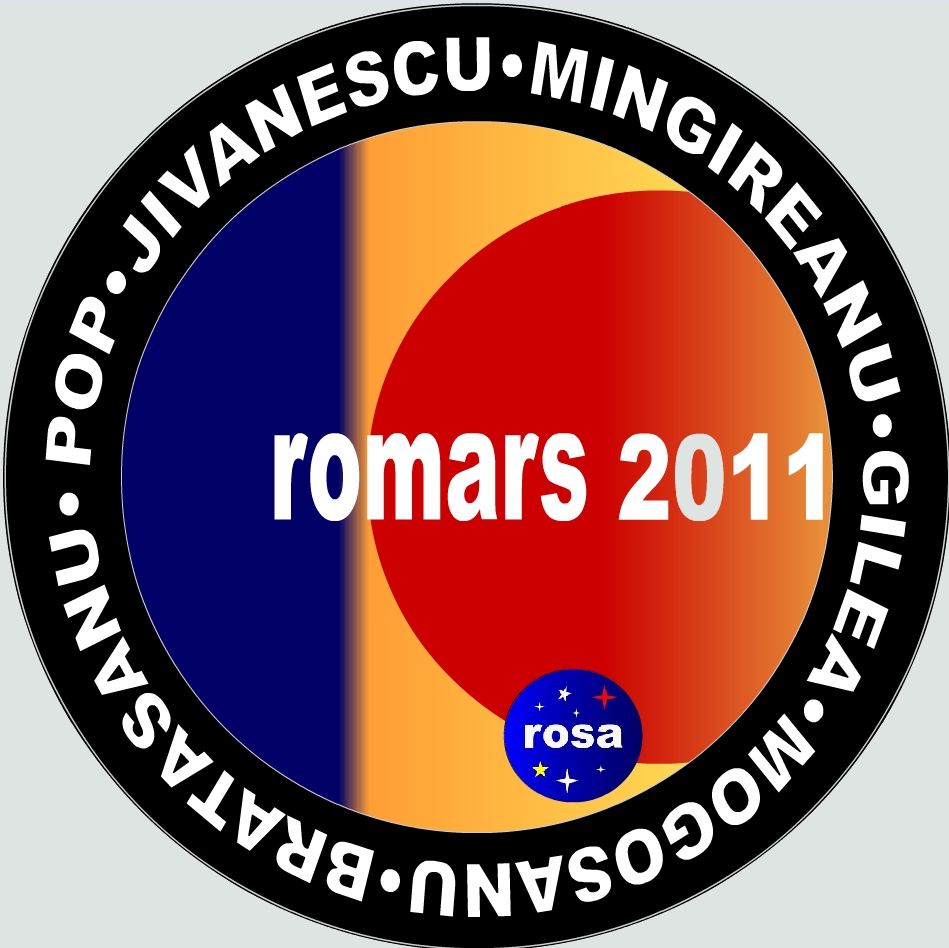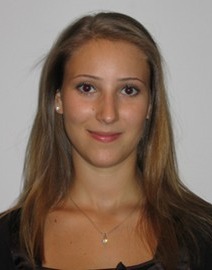MDRS Crew 98 - Romanian crew ROMARS
Jan 15 - 29, 2011
Daily Crew Reports

| Name | Speciality | |
| Virgiliu Pop | Mission Commander and Health & Safety Officer | |
| Iulia Jivanescu | Mission Geologist | |
| Beatrice "Betty" Gilea | Mission Biologist | |
| Florin Mingireanu | Mission Support | |
| Dragos Bratasanu | Engineer and Press Officer | |
| Haritina "Hari" Mogosanu | Executive Officer, Engineer, Biosecurity Officer, Agricultural Officer, and Astronomer |
 |
Virgiliu Pop (LL.B, LL.M, SSP07) – Mission Commander: Virgiliu is a 36 year-old Researcher with the Romanian Space Agency, where he works in the area of space law, space policy and astro-sociology. He is also in charge with educational and outreach programs, such as the World Space Week and Yuri’s Night. Virgiliu is a Law graduate, with a Masters degree in International and European Law, and with doctoral studies in the area of space law. He published his doctoral thesis – “Who Owns the Moon? Extraterrestrial Aspects of Land and Mineral Resources Ownership” with Springer, and several articles with Space Policy and Astropolitics. He is a staunch defender of space property rights and space exploration. Virgiliu attended the International Space University Summer Session Programme in 2007 at the Beihang University in Beijing. His expertise in space law is often sought by the international mass media, from the New York Times Magazine to Space.com, New Scientist, BBC, etc. He speaks six languages, is a PADI open water diver, and an avid traveler. |
 |
Iulia Jivanescu (B.Sc, M.Sc, SSP09, PhD Student) – Mission Geologist: Iulia is a 26 year-old Researcher with the Romanian Space Agency, where she works in the Space Applications - GIS and Remote Sensing Department. The main area of her research is Land Classification and Geomorphology, dealing with environmental issues and with information technology and communication. In 2003, she was awarded a research assistantship at Lamont Doherty Earth Observatory of Columbia University, where she researched the Long Island Sound hypoxia and changes in the oceanic circulation. Iulia received her first bachelor’s degree from the University of Bucharest, Faculty of Geography, in 2007. She was the valedictorian of her class, where she focused on Geology, Soil Chemistry, Geomorphology, and Remote Sensing. She then started a Masters Program in the field of GIS and Remote Sensing at Babes Bolyai University, Cluj-Napoca, Faculty of Geography, where she was the valedictorian of the class of 2008. Iulia is now enrolled in her second bachelor’s degree at the Polytechnic University of Bucharest, Faculty of Aerospace Engineering, where she is ranked in the top 5% students. She emphasizes on advanced Mathematics, Physics, Chemistry, Thermodynamics, and she will specialize in propulsion. Iulia is also enrolled in a 7-year PhD program in the field of Lunar Science at the Institute of Geography of the Romanian Academy. In 2009, Iulia participated in the Space Studies Program of International Space University at NASA Ames Research Center, the topic of her individual project being Lunar Mapping. Moon missions and change detection. |
 |
Beatrice "Betty" Gilea (B.Sc, M.Sc, PhD Student) – Mission Biologist: Beatrice is a 25 year-old Biologist - Research Assistant with the ICA Research & Development in Bucharest. Her current work includes microbiological analysis of food, microbiological control of drinking water, control of the hygiene state in production units (detection, enumeration and confirmation of microorganisms). She is also involved in the validation of work methods and developing specific work procedures. In 2007 Beatrice graduated from the University of Bucharest, Faculty of Biology, where she specialized in Biochemistry. She then attended the Master’s courses in Therapeutic Chemistry at the University of Bucharest. At present she is enrolled in her first year of study at the Doctoral School of Biology. |
 |
Florin Mingireanu (B.Sc, M.Sc Student, PhD Student) – Mission Engineer and Astronomer: Florin is a 27-year old Researcher with the Romanian Space Agency, where he works in the area of propulsion (micro thrusters and hybrid rocket motors). In 2004, he obtained his Bachelor of Science degree in Physics and Astronomy from the Louisiana State University. His past work experience involved developing software and hardware for space missions, and testing on high altitude balloons. His Mars experience include being deputy director of MIMIC (Magnetic Field Investigation of Mars by Interacting Consortia). In 2003, he was a Research Student with the Parabolic Flight Campaign of ESA in Bordeaux, France, and in 2006, he tested a gyroscopic system on a Zero-G flight at the Kennedy Space Center. He authored several academic papers and is currently enrolled at the Polytechnic University of Bucharest both as a M.Sc Student in space technology, and as a Ph.D Student in aerospace engineering and propulsion. |
 |
Dragos Bratasanu received the M.Sc. degree in electronics and telecommunications from the University Politehnica of Bucharest UPB, Romania, in 2008 with a thesis on learning and inferring spatial structures from satellite images using visual attention models and sequential fragmentation in the scenes. He is currently pursuing the Ph.D. degree at the University of Siegen ZESS, Germany. He is working as a research engineer for the Romanian Space Agency ROSA, developing tools aiming to bridge the gap between research and operations, with focus on semantic annotation and classification of satellite images for rapid mapping procedures for emergency interventions. In the last couple of years he won different awards at international satellite image processing competitions organized by the European Space Agency ESA, European Union Satellite Center EUSC, Joint Research Center JRC (2009) and Digital Globe (2010). His scientific interests include Bayesian inference, information and complexity theory, stochastic processes, model-based scene understanding, image information mining, for applications in information retrieval and understanding of high resolution optical observations, with emphasis on operational applications. |
 |
Haritina "Hari" Mogosanu (B.Sc., M.Sc.) - Mission Biosecurity Officer, Agricultural Officer, and Astronomer. Hari has a B.Sc. in Horticultural Engineering for which she introduced a new species of vegetable in Romania and an M.Sc. in Environmental Management for which she earned a TEMPUS scholarship at the Biological Sciences Department of Wye College Imperial College of London; to prepare her practical thesis she studied plant microbe interactions and advanced plant genetics and she was the valedictorian in her year. At present she is employed at MAF Biosecurity where she protects New Zealand's native flora and fauna.
Haritina is also an astronomy communicator and a science writer. She took papers in Communication and Public Relations at the National School of Political Studies and Public Administration (SNSPA) Bucharest Romania. She managed the Visitor Experience Department of the Carter Observatory Wellington New Zealand where she also delivered hundred of hours of planetarium presentations and public telescope sessions. Currently National Coordinator for New Zealand in the Ancient Skies project and Publicity Officer of the Royal Astronomical Society of New Zealand she is also on the Executive Board of the Space Foundation New Zealand as Chair of the Education Section. In her free time she is editing numerous astronomical magazines amongst which, the "Milky Way Kiwi" that she started in the International Year of Astronomy 2009, is New Zealand's first astrophotography magazine. For this, for creating a concept of an annual Polynesian Celestial Navigation Festival for which she had UNESCO support and for other accomplishments in the field of astronomy outreach she was awarded the “International Year of Astronomy 2009 Certificate of appreciation” in recognition of the commitment and outstanding contribution to the success of the international Year of Astronomy 2009 in Aotearoa New Zealand |

